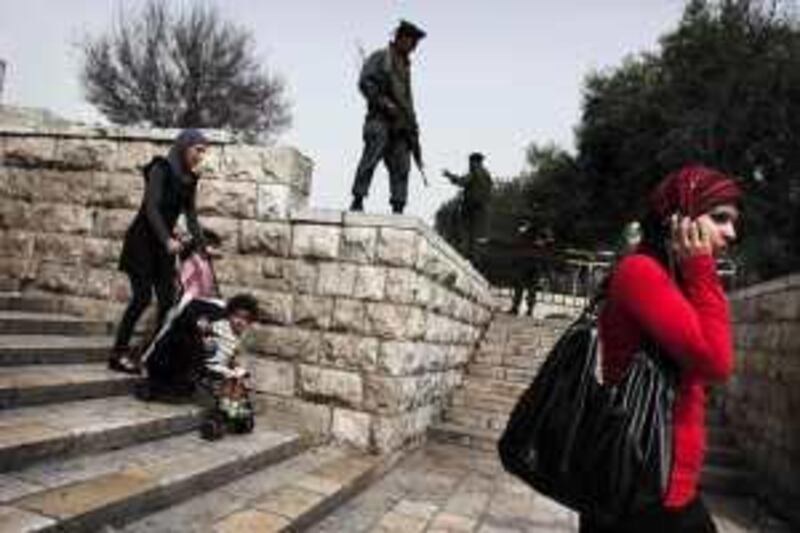WASHINGTON // Relations between the US and Israel are at their lowest point in 35 years, according to a senior diplomat. Michael Oren, Israel's ambassador to Washington, said the two countries faced "the most severe crisis since 1975". That year the US called for a partial Israeli withdrawal from the Sinai peninsula, then under Israeli occupation, igniting a major crisis between the two allies. Now, Israel observers here and around the world are closely watching the White House as Barack Obama plots his next move.
The administration has not said how it will proceed, but has shown no sign of backing down from its harsh criticism of an Israeli plan to build 1,600 new homes for Jewish settlers in East Jerusalem, which was announced last week in the middle of a visit to the region by the vice president, Joe Biden. Israeli officials said yesterday that they are being urged by Washington to cancel the newly approved settlement plans, a sign that the administration might be seeking to turn what has so far been a rhetorical dispute into one with tangible consequences. Israeli officials also said they were being urged to make a significant confidence-building gesture towards the Palestinians, including possibly releasing hundreds of Palestinian prisoners or turning over additional areas of the West Bank to Palestinian control.
A White House spokesman declined to comment on the reports, but the state department reaffirmed that Israel remains a vital strategic ally of the United States. For Mr Obama, who has had a cool relationship with Israel and the prime minister, Benjamin Netanyahu, the dispute marks a crossroads. He must decide whether to continue taking a hard line, further alienating Israel, or to defuse tensions without demanding major shift in Israeli policy. Returning to the status quo would probably alienate the Palestinians and undermine recent efforts to establish indirect talks between both sides.
A Palestinian Authority spokesman, Nabil Abu Rudeina, repeated yesterday that negotiations will not resume if settlement activity continues. "These policies do not create an appropriate atmosphere for the resumption of the peace process," he said. Meanwhile, Mr Netanyahu, who issued an initial apology for the timing of the announcement, reiterated that Israel plans to proceed with settlement construction.
George Mitchell, the US envoy to the Middle East, is scheduled to arrive in the region this week for talks with both sides. A state department spokeswoman, Megan Mattson, declined to say how the dispute would affect Mr Mitchell's visit or whether he carried a new directive from the president to urge Israel to scrap its settlement plans. Many questions may be answered at the annual gathering of the American Israel Public Affairs Committee (Aipac), the most powerful pro-Israel lobbying group, which is scheduled for next week. Both Mr Netanyahu and Hillary Clinton, the secretary of state, are scheduled to address the conference on Monday.
The state department has given no indication that Mrs Clinton, who has been among the administration's harshest critics of the settlement plan, is reconsidering her plans to attend the conference. A decision to back out, or to send a lower-ranking official, would be yet another strong message of condemnation from the administration, according to Philip Wilcox, the US consul general in Jerusalem in the 1990s and president of the Foundation for Middle East Peace. "That will be a political signal that something is wrong in the relationship," he said.
Aipac called the Obama administration's sharp rhetoric "a matter of serious concern" and urged the White House "to take immediate steps to defuse the tension with the Jewish State". "The administration should make a conscious effort to move away from public demands and unilateral deadlines directed at Israel, with whom the United States shares basic, fundamental, and strategic interests," Aipac said.
Meanwhile the new, moderate Israel lobbying group, J Street, issued a statement yesterday, calling the administration's reaction "understandable and appropriate" and urging to turn the crisis into an "opportunity" to resume negotiations over permanent borders for a Palestinian state. "Bold American leadership is needed now to turn this crisis into a real opportunity to end the Israeli-Palestinian conflict, which is a fundamental American national security interest," the statement said.
The Obama administration's strong condemnation was also praised yesterday by the Saudi foreign minster, Prince Saud al Faisal, who accused Israel of "recklessness" for disrupting the peace process. He urged the administration to follow up words with actions. "International stances remain limited unless they are accompanied by measures to address Israel's unilateral actions", he said in an interview with Al-Riyadh newspaper. " United States has serious responsibilities in this regard, especially as a sponsor of the peace process."
In diplomatic circles, few are ready to call the dispute a major turning point in US-Israeli relations. Mr Wilcox, the former US consul general, said it is too early to tell what the effect will be. "Unless the government of Israel and the Israeli public realise that they cannot continue to defy American interest without doing some damage to the US-Israel relationship then this behaviour will continue," he said.
But Richard Murphy, a former US ambassador to Saudi Arabia who served as assistant secretary of state for Near Eastern and South Asian affairs during Ronald Reagan's presidency, said the public criticism from the Obama administration has already changed the parameters of the US-Israeli relationship and put an end to the notion, reiterated by Mr Biden last week, that there is "no space" between the longtime allies.
"I don't minimise the importance of rhetoric. That's educational for the public, and for Congress, and shows that our interest are not 100 per cent aligned," he said. "This is the opening of a much more honest debate on differences in policy." @Email:sstanek@thenational.ae * With additional reporting by Agence France-Presse






